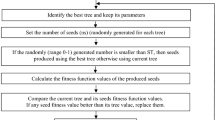Abstract
In the present study, a novel strategy of Lower-dimensional-Search Algorithm (LDSA) is proposed for solving the complex numerical optimization problems. The crossover operator of the LDSA algorithm searches a lower-dimensional neighbor of the parent points where the neighbor center is the parents’ barycenter, therefore, the new algorithm converges fast. The niche impaction operator and the offspring mutation operator preserve the diversity of the population. The proposed LDSA strategies are applied to 22 test problems. These functions are widely used as benchmark in numerical optimization. The experimental results are reported here show that the LDSA algorithm is an effective algorithm for the complex numerical optimization problems. What’s more is that the LDSA algorithm is simple and easy to be implemented.
Preview
Unable to display preview. Download preview PDF.
Similar content being viewed by others
References
Back, T., Fogel, D.B., Michalewicz, Z. (eds.): Handbook of Evolutionary Computation. Institute of Physics Publishing (1997)
Michalewicz, Z.: Genetic algorithms + data structures = evolution programs, 2nd edn. Springer, New York (1994)
Clerc, M., Kennedy, J.: The particle swarm-explosion, stability, and convergence in a multidimensional complex space. IEEE Transactions on Evolutionary Computation 6(1), 58–73 (2002)
Parsopoulos, K.E., Vrahatis, M.N., N, M.: Recent approaches to global optimization problems through particle swarm optimization. Natural Computing 1(2-3), 235–306 (2002)
Andrews, P.S.: An Investigation into Mutation Operators for Particle Swarm Optimization. 2006 IEEE Congress on Evolutionary Computation, pp.3789–3796 (2006)
Storn, R., Price, K.V.: Differential evolution-A simple and Efficient Heuristic for Global Optimization over Continuous Spaces. Journal of Global Optimization 11, 341–359 (1997)
Lampinen, J., Zelinka, I.: Mixed Variable Non-Linear Optimization by Differential Evolution. In: Proceedings of Nostradamus’99,2nd International Prediction Conference, pp. 45–55. Zlin, Czech Republic. Technical University of Brno, Faculty of Technology Zlin, Department of Automatic Control (October 1999), ISBN 80-214-1424-3
Price, K., Storn, R., Lampinen, J.: Differential Evolution –A Practical Approach to Global Optimization. Springer, Heidelberg (2005)
Gehlhaar, D.K., Fogel, D.B.: Tuning evolutionary programming for conformationally flexible molecular docking. In: Fogel, L.J., Angeline, P.J., Bäck, T. (eds.) Evolutionary Programming V: Proc. of the Fifth Annual Conference on Evolutionary Programming, pp. 419–429. MIT Press, Cambridge, MA (1996)
Yao, X., Liu, Y., Lin, G.M.: Evolutionary programming made faster. IEEE Trans. Evolutionary Computation 3, 82–102 (1999)
Gustafson, S., Burke, E.K.: A Niche for Parallel Island Models: Outliers and Local Search. In: ICPPW 2005. Proceedings of the 2005 International Conference on Parallel Processing Workshops, pp. 1530–2016 (2005)
Törn, A., Z̆ilinskas, A.: Global Optimization. LNCS, vol. 350. Springer, Heidelberg (1989)
Schwefel, H.-P.: Evolution and Optimum Seeking. Wiley, New York (1995)
Tu, Z., Lu, Y.: A robust stochastic genetic algorithm (stga) for global numerical optimization. IEEE Trans. Evolutionary Computation 8(5), 456–470 (2004)
André, V., da Cruz, A., Vellasco, M.M.B.R.: Quantum-Inspired Evolutionary Algorithm for Numerical Optimization. 2006 IEEE Congress on Evolutionary Computation, pp. 9181–9187 (2006)
Author information
Authors and Affiliations
Editor information
Rights and permissions
Copyright information
© 2007 Springer-Verlag Berlin Heidelberg
About this paper
Cite this paper
Shi, H. et al. (2007). A Novel Lower-Dimensional-Search Algorithm for Numerical Optimization. In: Kang, L., Liu, Y., Zeng, S. (eds) Advances in Computation and Intelligence. ISICA 2007. Lecture Notes in Computer Science, vol 4683. Springer, Berlin, Heidelberg. https://doi.org/10.1007/978-3-540-74581-5_23
Download citation
DOI: https://doi.org/10.1007/978-3-540-74581-5_23
Publisher Name: Springer, Berlin, Heidelberg
Print ISBN: 978-3-540-74580-8
Online ISBN: 978-3-540-74581-5
eBook Packages: Computer ScienceComputer Science (R0)




